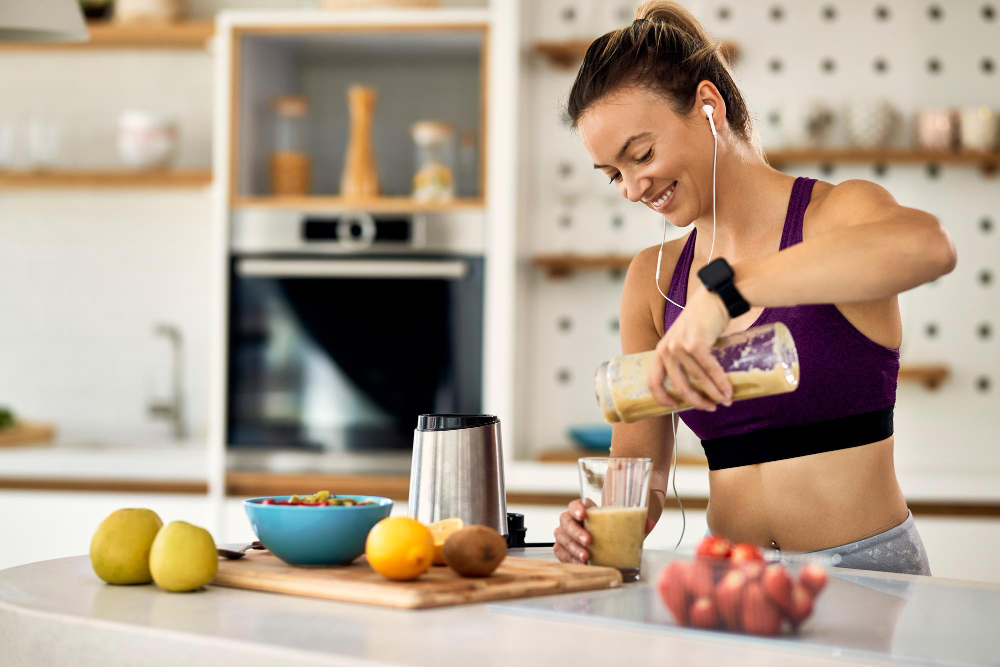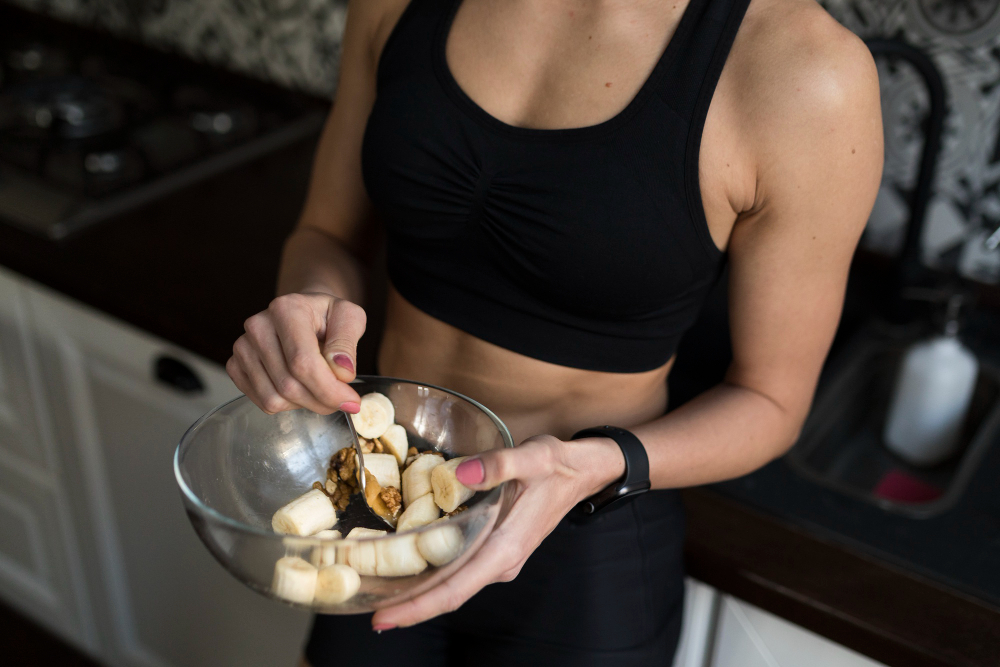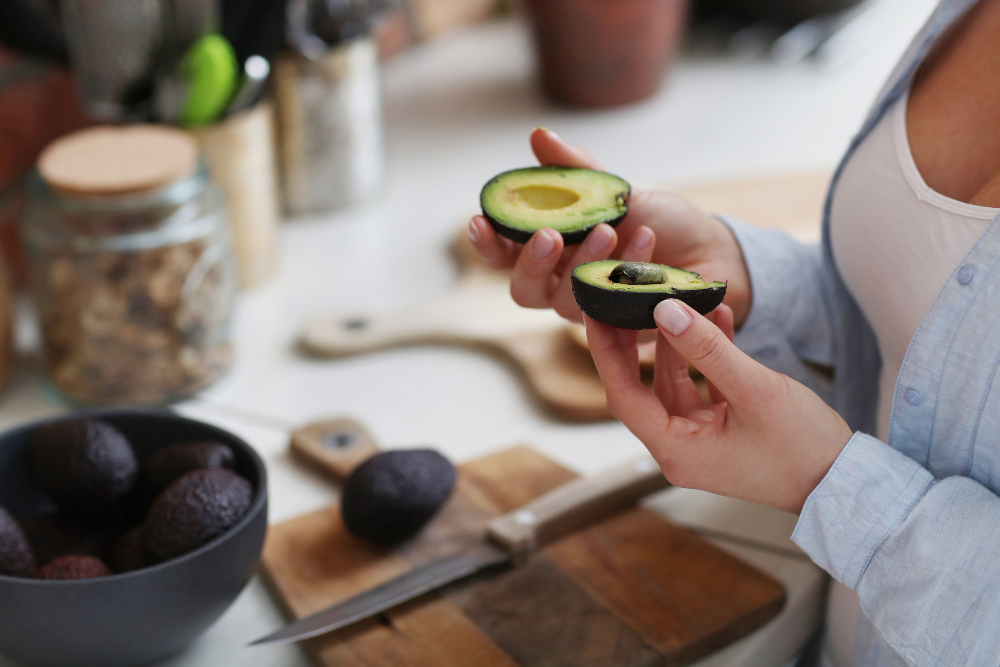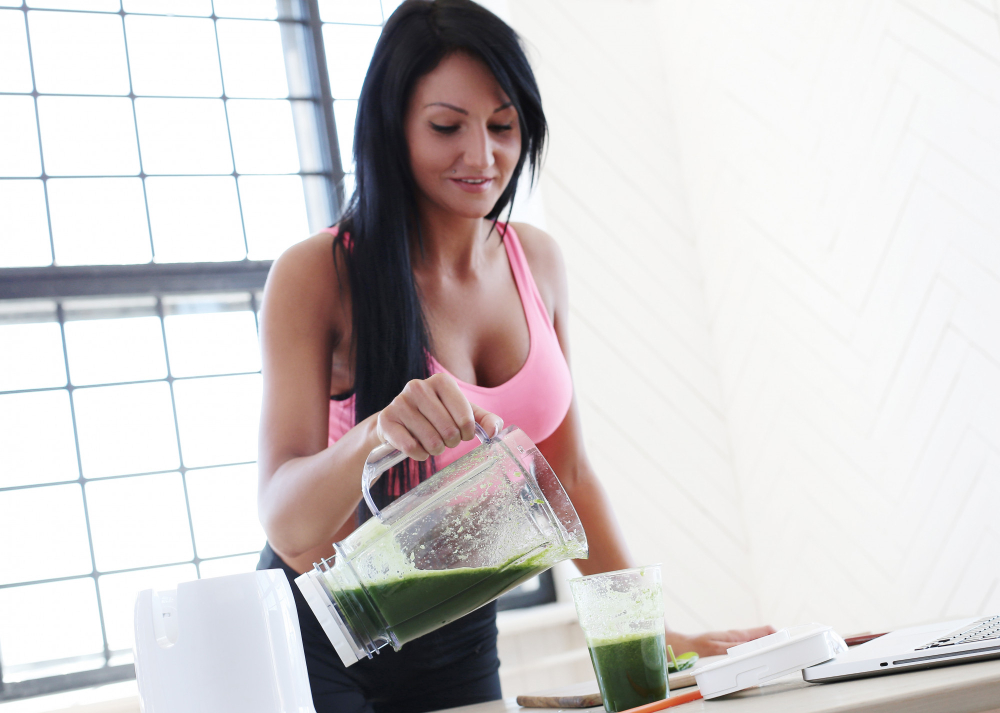- Fast results
- 4,000+ locations
- 4.8 star rating
Need Help? (888) GET LABS



Behind their ripped abs, sculpted arms, and strength that put superheroes to shame, female bodybuilders put tons of effort not just in training but in their nutrition as well.
Bodybuilders are known to jack up their protein and fiber intake to appear, well, jacked. But more than protein shakes and lettuce, a female bodybuilder’s diet is composed of diverse macronutrients in varied proportions based on their fitness goal.
Let’s crack the code to a female bodybuilder’s eating plan and see how each food source fits into the health goal equation.
Looking for a blood test designed primarily for bodybuilders? We’ve got you covered. Order the Bodybuilder Blood Test Panel. Establish a reference point for your health monitoring and performance progress to let you move closer to your body goals.

A female bodybuilder’s body, much that of its male counterpart, relies on a sculpted physique that underscores a muscular tone. That said, the ability to grow and strengthen muscles(1) is the very core of the process. In this endeavor, a diet consisting of food sources packed with a huge punch of protein is non-negotiable.
Protein fibers compose a muscle. When doing consistent strength or resistance training, these fibers wear and tear to a microscopic degree. As these fibers are rebuilt, they expand and grow larger, paving the way to more prominent muscles. However, to ensure and speed up such an effect, you have to intake high amounts of amino acids(2), the building blocks of proteins.
Sources of proteins can be classified as animal or plant-based.
Animal-based protein sources:
Plant-based protein sources
Naturally, a vegan bodybuilding diet for females must lean more toward plant-based protein sources. However, these contain less protein than animal sources. Hence, some bodybuilders compensate by adding protein supplementation post-workout, such as soy protein or Whey protein powder.

Other diets that focus on weight loss may restrict carbohydrates. However, as female bodybuilders require energy replenishment, additional calories, and increased nutrient absorption, carbohydrates, particularly complex ones, are crucial in their diets.
Unlike simple carbohydrates, complex carbohydrates break down more slowly. Thus, they provide a steady stream of energy, while simple carbohydrates cause a spike in blood sugar, leading to energy crashes that cause fatigue. Naturally, a consistent energy level(3) is ideal for a woman bodybuilder who constantly trains in the gym.
Complex carbohydrates(4) also ensure glycogen replenishment, aiding in muscle recovery and repair. Glycogen is a form of glucose stored in the liver and muscles. It is used when the body requires an additional energy boost to fuel the cells.
Blood glucose typically provides such energy. However, as bodybuilding demands more, individuals working out use their glycogen. If not replaced, you may experience low blood sugar levels (hypotension) that cause fatigue, dizziness, and difficulty focusing.
Some of the best sources of complex carbohydrates for female bodybuilders and weightlifters include:
While fruits and vegetables are generally recommended as top foods for healthy diets, several conditions may restrict you from readily adding certain sources of complex carbohydrates. For example, if you have celiac disease or gluten sensitivity, you must check with your doctor to confirm how certain fruits or veggies might impact your condition.

Fats may have been labeled as the enemy in the past years, but not all are bad. Good or healthy fats(5) can bring wonders to your health, especially if you’re growing your muscles.
Female bodybuilders need healthy fats, although not as much as male bodybuilders(6), to regulate the secretion of hormones, like estrogen and testosterone, which influence muscle growth and development. These fats also improve satiety, reducing cravings or the desire to overeat, particularly during the phase where caloric intake must be lowered.
The presence of sufficient healthy fats also improves the absorption of fat-soluble vitamins. These include vitamins A, D, E, and K, which are known to improve metabolism and immunity–functions that must be properly regulated if you’re into bodybuilding. Otherwise, you may become prone to diseases or digestive problems.
Fats can also support energy production(7) as a supplement to glucose. In bodybuilding, additional energy sources are crucial as your vigor can swiftly diminish due to the intensive training involved.
In addition, healthy fats help reduce inflammation(8), especially around the muscles. They also support muscle repair for smooth post-workout recovery.
Healthy fats can be classified into monounsaturated fats (MUFAs) and polyunsaturated fats. Monounsaturated fats help lower bad cholesterol while boosting good cholesterol. On the other hand, polyunsaturated fats (PUFAs) improve brain function, muscle strength, and blood cholesterol levels.

Bodybuilders may be notorious for amplifying their protein intake, but that doesn’t change the fact that they need fiber as much.
Fiber ensures that gut health remains at its prime(9). Including rich sources of fiber in your bodybuilding diet promotes a good balance in the gut microbiome. As a result, nutrient absorption improves, contributing to your body’s optimum performance.
As with fats, fiber also makes you feel full for much longer, preventing you from craving or overeating when you’re in the cutting phase. It also allows you to maintain a good energy level, as fiber helps control blood sugar levels. That way, you have a lower risk of experiencing energy crashes.
The best sources of fiber for a female bodybuilder diet are the following:
If you have or suspect food allergies, it’s best to confirm if these organic food items can trigger an allergic reaction before designing your daily bodybuilding meal plan. Make sure to consult your doctor, take the necessary allergy blood test or skin test, and eliminate food sources that cause your immune system to react.
Also read: 8 Rare Food Allergies and How to Spot Them
One of the core activities of bodybuilding is creating meal plans that support muscle growth, energy buildup for training, post-workout recovery, and performance optimization. Keep in mind, however, that there is no one-size-fits-all bodybuilding diet, whether for males or females.
Your body goal composition is crucial in determining whether you need to bulk (grow your muscles) or cut (trim fats) to get one step closer to your ideal physique. In addition, it’s important to note that bodybuilding is not just about physical aesthetics.
When planning your nutrition and training, your overall health must be considered. Aside from nutrients involved in muscle growth and repair, macronutrients that improve metabolism, immunity, and stark organ function must be included and taken into account when planning a female bodybuilder eating plan.
The fact that bodybuilding equates to muscle growth, requiring protein, makes it easy to assume that meat-eaters have the advantage in the game. But contrary to this belief, vegans are as well-suited to become bodybuilders as those who consume meat and animal-based food products.
The following tips can benefit vegan women bodybuilders. They will ensure they get the required nutrition for the sport.
Veganism and bodybuilding can go together, provided that you secure the right sources of nutrition relevant to growing more muscles and managing your overall health. Talk to your doctor or dietitian for a more tailored eating plan.
Also Read: 6 Essential Things You Need to Know Before Going Vegan
While the actual calories that a female bodybuilder must consume vary according to several factors, the amount they eat during the bulking or muscle-building phase is generally higher than that of an average person. It can range between 2500 and 4000 calories per day. The numbers will depend on body weight, workout intensities, health status, and unique physical goals.
Bodybuilding follows a formula that allows men and women to sculpt their physiques. Female bodybuilders must maintain strength training to ensure ideal muscle growth. This involves various workouts that target specific muscles. Nutrition also plays a role in the bulking process, as women bodybuilders must consume high-protein food sources and increase calories for bulking.
Training and nutrition must work together to ensure muscular growth. Bodybuilders must also secure adequate rest, continuous dedication, and a good understanding of their genetics and unique physical attributes.
No single diet is superior to the others when it comes to female bodybuilding. This is because each individual’s health and physical needs are unique. However, the general principle for choosing a suitable diet for female bodybuilders is to ensure it contains foods with high protein and other macronutrients. Optimal nutrition also requires whole, unprocessed foods and frequent hydration.
A bodybuilding diet must fit the individual’s needs and health goals. That said, it’s crucial that nutrition planning is not simply aimed toward achieving pleasing body aesthetics common to bodybuilders. Improving strength, power, and overall health functions must be a priority, as much as a jacked physique.
1 Krzysztofik M, Wilk M, Wojdała G, Gołaś A. Maximizing Muscle Hypertrophy: A Systematic Review of Advanced Resistance Training Techniques and Methods. Int J Environ Res Public Health. 2019 Dec 4;16(24):4897. doi: 10.3390/ijerph16244897. PMID: 31817252; PMCID: PMC6950543.
2 Church DD, Hirsch KR, Park S, Kim IY, Gwin JA, Pasiakos SM, Wolfe RR, Ferrando AA. Essential Amino Acids and Protein Synthesis: Insights into Maximizing the Muscle and Whole-Body Response to Feeding. Nutrients. 2020 Dec 2;12(12):3717. doi: 10.3390/nu12123717. PMID: 33276485; PMCID: PMC7760188.
3 Roberts BM, Helms ER, Trexler ET, Fitschen PJ. Nutritional Recommendations for Physique Athletes. J Hum Kinet. 2020 Jan 31;71:79-108. doi: 10.2478/hukin-2019-0096. PMID: 32148575; PMCID: PMC7052702.
4 de Moraes WMAM, de Almeida FN, Dos Santos LEA, Cavalcante KDG, Santos HO, Navalta JW, Prestes J. Carbohydrate Loading Practice in Bodybuilders: Effects on Muscle Thickness, Photo Silhouette Scores, Mood States and Gastrointestinal Symptoms. J Sports Sci Med. 2019 Nov 19;18(4):772-779. PMID: 31827362; PMCID: PMC6873117.
5 Liu AG, Ford NA, Hu FB, Zelman KM, Mozaffarian D, Kris-Etherton PM. A healthy approach to dietary fats: understanding the science and taking action to reduce consumer confusion. Nutr J. 2017 Aug 30;16(1):53. doi: 10.1186/s12937-017-0271-4. PMID: 28854932; PMCID: PMC5577766.
6 Bauer P, Majisik A, Mitter B, Csapo R, Tschan H, Hume P, Martínez-Rodríguez A, Makivic B. Body Composition of Competitive Bodybuilders: A Systematic Review of Published Data and Recommendations for Future Work. J Strength Cond Res. 2023 Mar 1;37(3):726-732. doi: 10.1519/JSC.0000000000004155. Epub 2023 Jan 18. PMID: 36727905.
7 Calder PC. Functional Roles of Fatty Acids and Their Effects on Human Health. JPEN J Parenter Enteral Nutr. 2015 Sep;39(1 Suppl):18S-32S. doi: 10.1177/0148607115595980. Epub 2015 Jul 15. PMID: 26177664.
8 Calder PC. Omega-3 fatty acids and inflammatory processes: from molecules to man. Biochem Soc Trans. 2017 Oct 15;45(5):1105-1115. doi: 10.1042/BST20160474. Epub 2017 Sep 12. PMID: 28900017.
9 Gill SK, Rossi M, Bajka B, Whelan K. Dietary fibre in gastrointestinal health and disease. Nat Rev Gastroenterol Hepatol. 2021 Feb;18(2):101-116. doi: 10.1038/s41575-020-00375-4. Epub 2020 Nov 18. PMID: 33208922.
10 Morton RW, Murphy KT, McKellar SR, Schoenfeld BJ, Henselmans M, Helms E, Aragon AA, Devries MC, Banfield L, Krieger JW, Phillips SM. A systematic review, meta-analysis and meta-regression of the effect of protein supplementation on resistance training-induced gains in muscle mass and strength in healthy adults. Br J Sports Med. 2018 Mar;52(6):376-384. doi: 10.1136/bjsports-2017-097608. Epub 2017 Jul 11. Erratum in: Br J Sports Med. 2020 Oct;54(19):e7. doi: 10.1136/bjsports-2017-097608corr1. PMID: 28698222; PMCID: PMC5867436.

© Copyright 2025 Personalabs. All Rights Reserved.